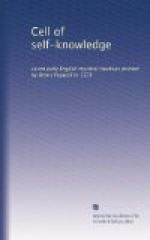is Benjamin born. For as by Joseph discretion,
so by Benjamin we understand contemplation. And
both are they born of one mother, and gotten of one
father. For through the grace of God lightening
our reason, come we to the perfect knowing of ourself
and of God, that is to say, after that it may be in
this life. But long after Joseph is Benjamin
born. For why, truly but if it so be that we use
us busily and long in ghostly travails, with the which
we are learned to know ourself, we may not be raised
in to the knowing and contemplation of God. He
doth for nought that lifteth up his eye to the sight
of God, that is not yet able to see himself. For
first I would that a man learned him to know the unseeable[105]
things of his own spirit, ere he presume to know the
unseeable things of the spirit of God; and he that
knoweth not yet himself and weeneth that he hath gotten
somedeal knowing of the unseeable things of God, I
doubt it not but that he is deceived; and therefore
I rede that a man seek first busily for to know himself,
the which is made to the image and the likeness of
God as in soul. And wete thou well that he that
desireth for to see God, him behoveth to cleanse his
soul, the which is as a mirror in the which all things
are clearly seen, when it is clean; and when the mirror
is foul, then mayst thou see nothing clearly therein;
and right so it is of thy soul, when it is foul, neither
thou knowest thyself nor God. As when the candle
brenneth, thou mayst then see the self candle[106]
by the light thereof, and other things also; right
so, when thy soul brenneth in the love of God, that
is, when thou feelest continually thine heart desire
after the love of God, then, by the light of His grace
that He sendeth in thy reason, thou mayst see both
thine own unworthiness and His great goodness.
And therefore cleanse thy mirror and proffer thy candle
to the fire; and then, when thy mirror is cleansed
and thy candle brenning, and it so be that thou wittily
behold thereto, then beginneth there a manner of clarity
of the light of God for to shine in thy soul, and
a manner of sunbeam that is ghostly to appear before
thy ghostly sight, through the which the eye of thy
soul is opened to behold God and godly things, heaven
and heavenly things, and all manner of ghostly things.
But this sight is but by times, when God will vouchsafe
for to give it to a working[107] soul, the whiles
it is in the battle of this deadly life; but after
this life it shall be everlasting. This light
shone in the soul of David, when he said thus in the
psalm: “Lord, the light of Thy face is marked
upon us; Thou hast given gladness within mine heart."[108]
The light of God’s face is the shining of His
grace, that reformeth in us His image that hath been
disfigured with the darkness of sin; and therefore
a soul that brenneth in desire of His sight,[109] if
it hope for to have that that it desireth, wete it
well it hath conceived Benjamin. And, therefore,
what is more healfull[110] than the sweetness of this




